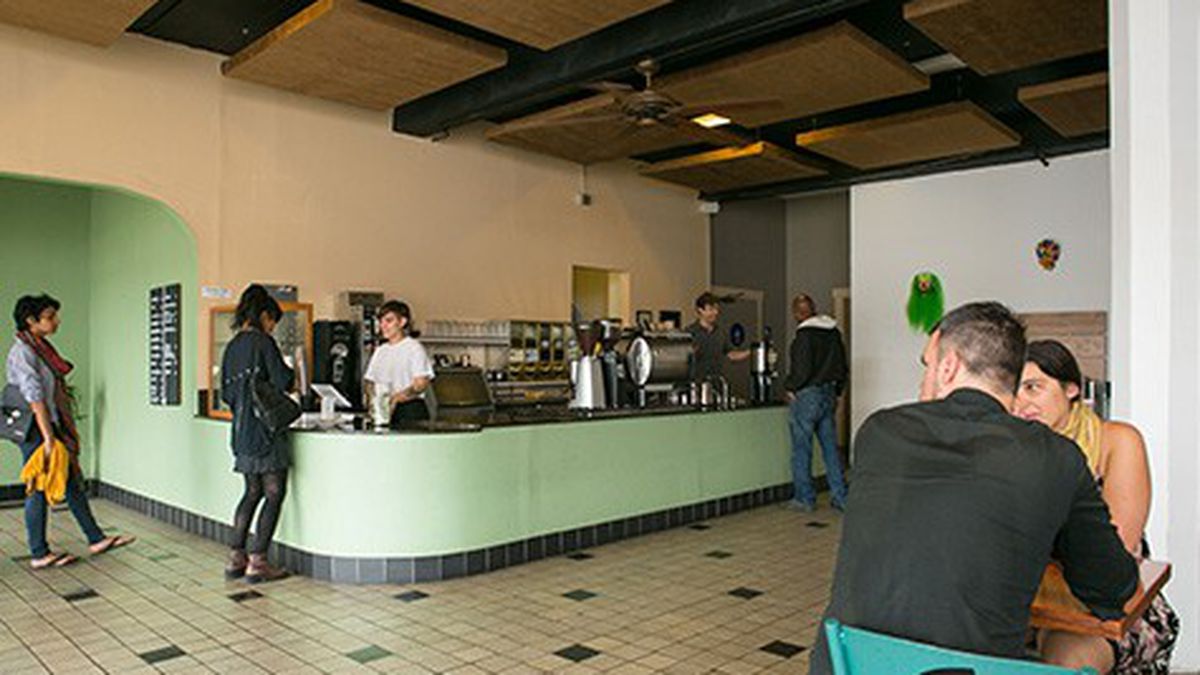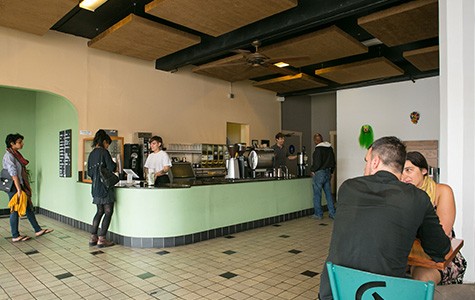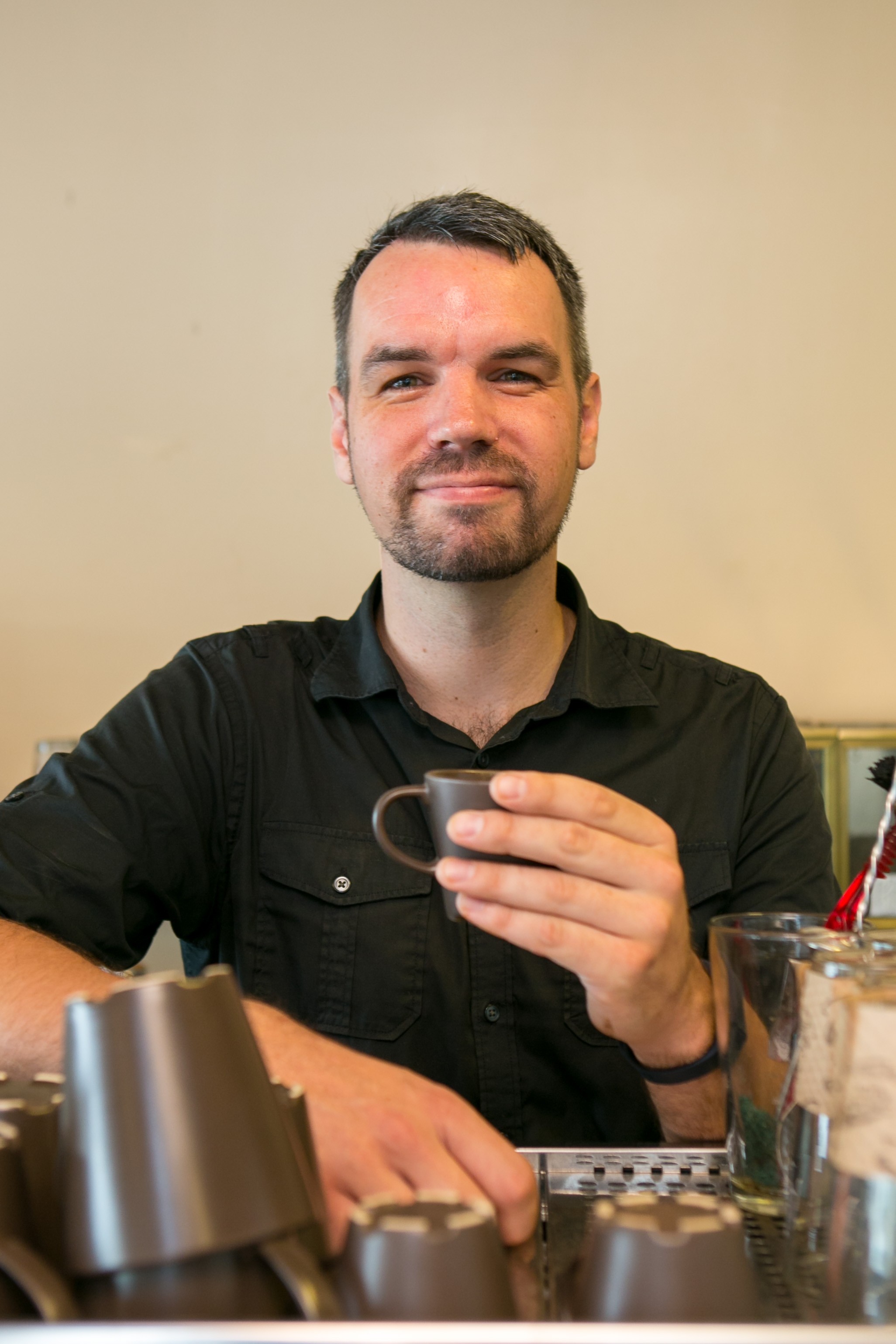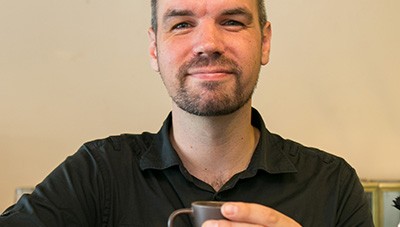Every cafe must reckon with Wi-Fi. After deciding whether or not to offer it – for free or at cost or for a finite time only – businesses must also decide how to present that policy to their customers: with a provocative explanation or none at all? Cafes are increasingly divided — not necessarily by their position on whether to offer Wi-Fi, but how that position is conveyed.
At Black Spring Coffee Company (2930 Telegraph Ave, Oakland), opened by Ryan Stark less than a year ago, floor-to-ceiling windows spill light into a sparsely furnished expanse of tables and chairs. It’s conspicuously unadorned, from the furniture to the menu, which lists standard coffee drinks and traditional pastries in white chalk at reasonable prices. One recent afternoon when I was there, the cafe was bustling steadily without ever feeling stifling — a pace and atmosphere that partly reflected an undeclared feature of the cafe: no internet.
“The first decision was about what kind of coffee we’d have,” said Stark. “The second was to not have Wi-Fi.” He also decided not to announce it. Stark’s matter-of-fact approach to eschewing Wi-Fi is also reflected in the pastry case — all vegan, no sign. “If someone’s identity is about whether or not a scone is vegan, that’s not going to last very long,” said Stark, who doesn’t eat dairy but avoids identifying as a vegan.
Timeless Coffee Roasters (4252 Piedmont Ave., Oakland), a cafe, roaster, and bakery, approaches its Wi-Fi and dairy pastries the same way. That is, neither are available — and that fact is unannounced. Owner RJ Leimpeter, who’s been vegan for seventeen years, partly considers this a practical decision. Omitting announcements was deliberate as well. “I wanted it to not be abrasive and not be judgmental,” he said, adding that he offered free drinks to customers who were skeptical of soy and almond milk early on. “I like it when it’s loud in here. There are four places that offer Wi-Fi on this street.”
In downtown Oakland, Awaken Cafe (1429 Broadway), which features a long bar, clusters of tables, and a small stage for hosting music shows, takes a more declarative approach to Wi-Fi. One recent day during lunchtime, a journalist hunkered down at one table, surrounded by papers and conducting interviews on the phone. A few businessmen on break chatted nearby. One area was declared a “computer free zone” by little signs on the table — that is, intended for “technology-free-being, friend-conversing, craft-beer-sipping, tall-tale-telling, heated-political-sparring, new-interest-flirting, ideas-on-napkin-sketching” and so on.
Actual Cafe (6334 San Pablo Ave., Oakland) displays its zippy catchphrase on the street-facing sign: “Not just another Wi-Fi shack.” Inside, contradictory messages continue. Little signs offer rewards for “checking in” online next to signs that tell customers to take phone conversations outside. There are signs about which power outlets to use. Behind the register is a big sign that says, “Our weekends are laptop free. Ask us why.” Recently, an employee explained that the weekends are laptop-free because Actual becomes a full-service restaurant on those days, so it’s mostly a practical measure intended to discourage diners from lingering.
Likewise, Awaken only enforces “ideas-on-napkin-sketching” time after five, and even then there’s a computer annex. Both cafes frame the Wi-Fi issue like a battle, but they try to play both sides. While the signs claim moral high ground, the actual policies allow for Wi-Fi use.
Stark thinks his approach is more straightfoward. “[Having Wi-Fi] would be a burden to my business eventually, because the focus on coffee gets lost. I have baristas who are very well-trained, making my favorite coffee in the world, but they’d have to stop and become tech-support.” As for his decision to reject signage, he doesn’t think that atmosphere can be prescribed. “The identity of a coffee shop is really just about the people who go there and the people who work there.”
Indeed, Actual and Awaken, the most vocal proponents of “technology-free-being” are characterized by computer use, contrary to what their signs would have customers believe. In the so-called “1099 economy,” self-employment is increasingly the norm. Taking laptops to cafes allows people to separate the workspace from the home. Furthermore, computers are creative instruments; it’s unfair to separate Wi-Fi seekers from the creative types who used to scribble on napkins before it became a cliché.
Arbor Cafe (4210 Telegraph Ave., Oakland), which features a spacious floor plan and charmingly mismatched furniture, is perhaps most closely associated with computer use. It’s usually packed with people in Google-branded gear and countercultural uniforms alike, mostly rattling away on laptops. In the last three years, Arbor only changed its Wi-Fi password once. And yet it’s more like Black Spring than Awaken or Actual, because it provides Wi-Fi in an undeclared, matter-of-fact way. There’s no awkward friction between Arbor’s image of itself and its actual atmosphere.
Arbor, Black Spring, and Timeless decide what to offer and withhold, but they don’t moralize or dictate how customers should feel about it. “If there’s signage about what cafes don’t do, isn’t that weird?” Leimpeter said. “Just do what you do.”


















